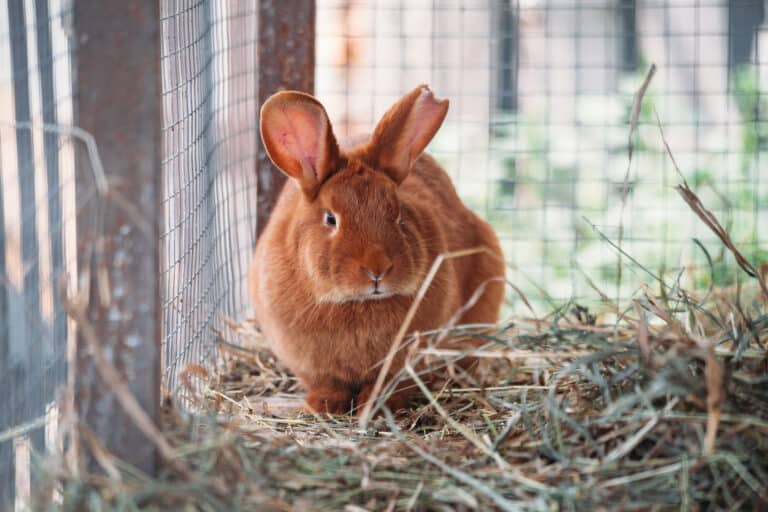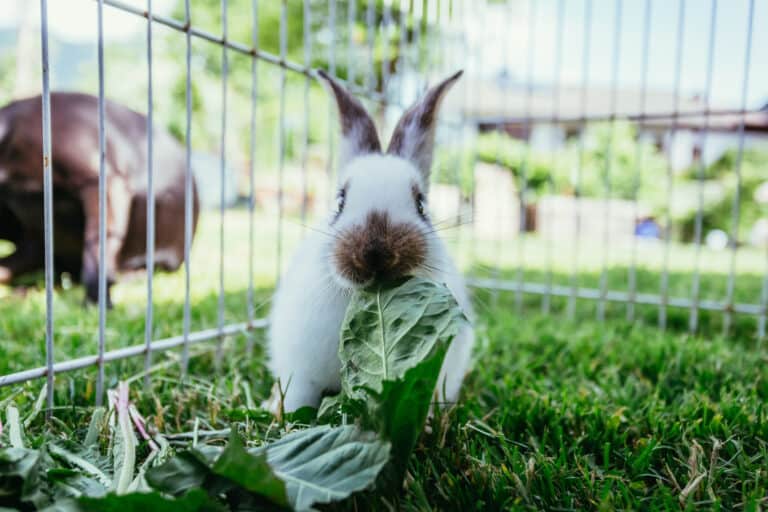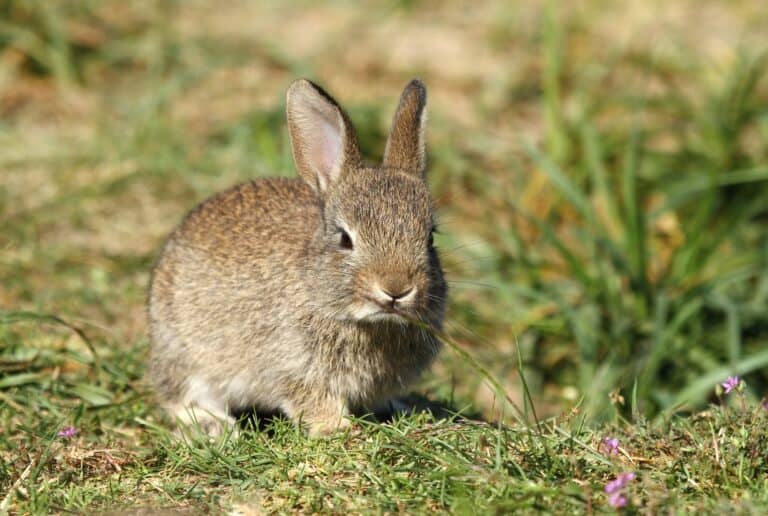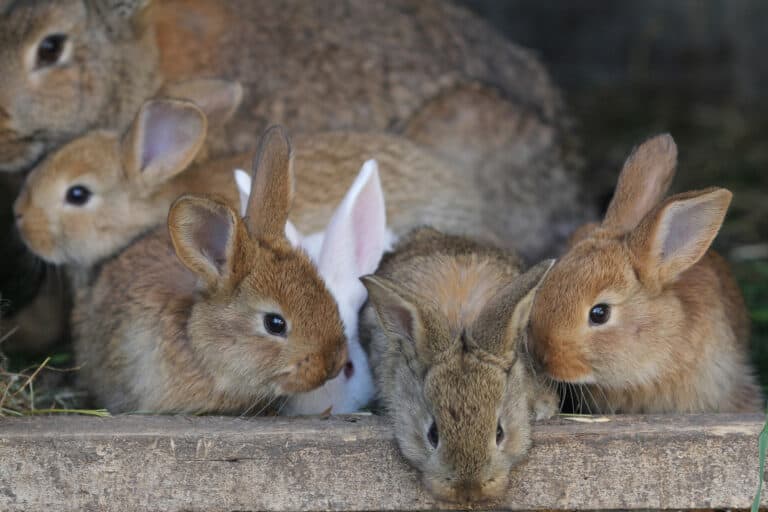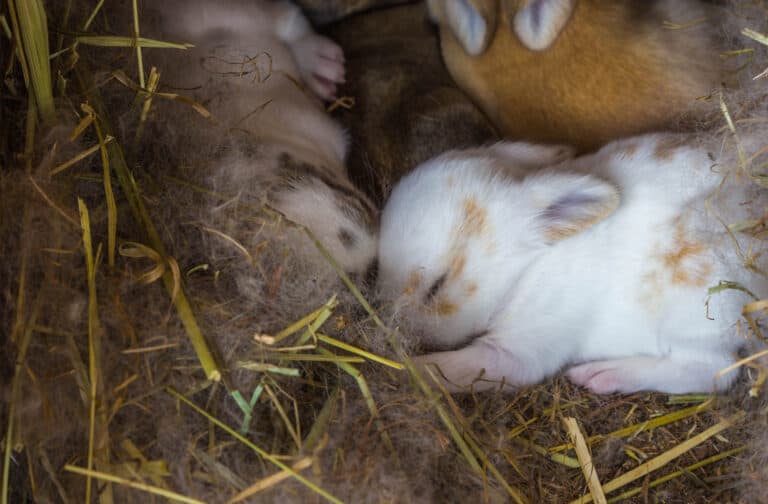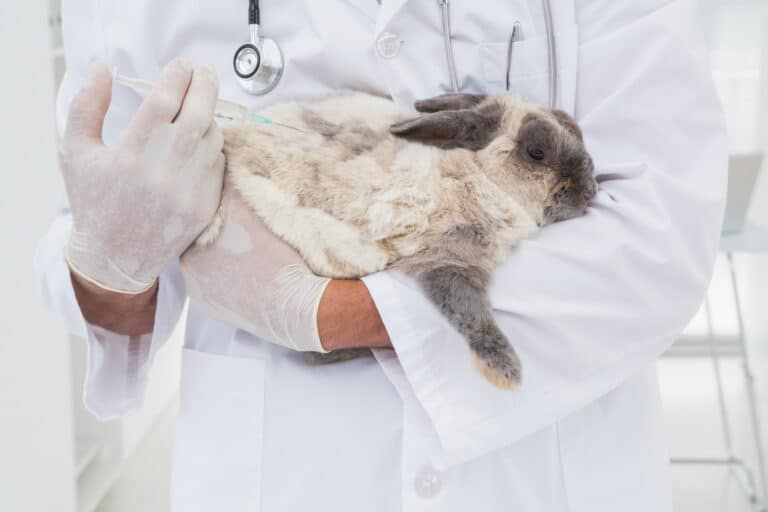Can Rabbits Drink Milk?
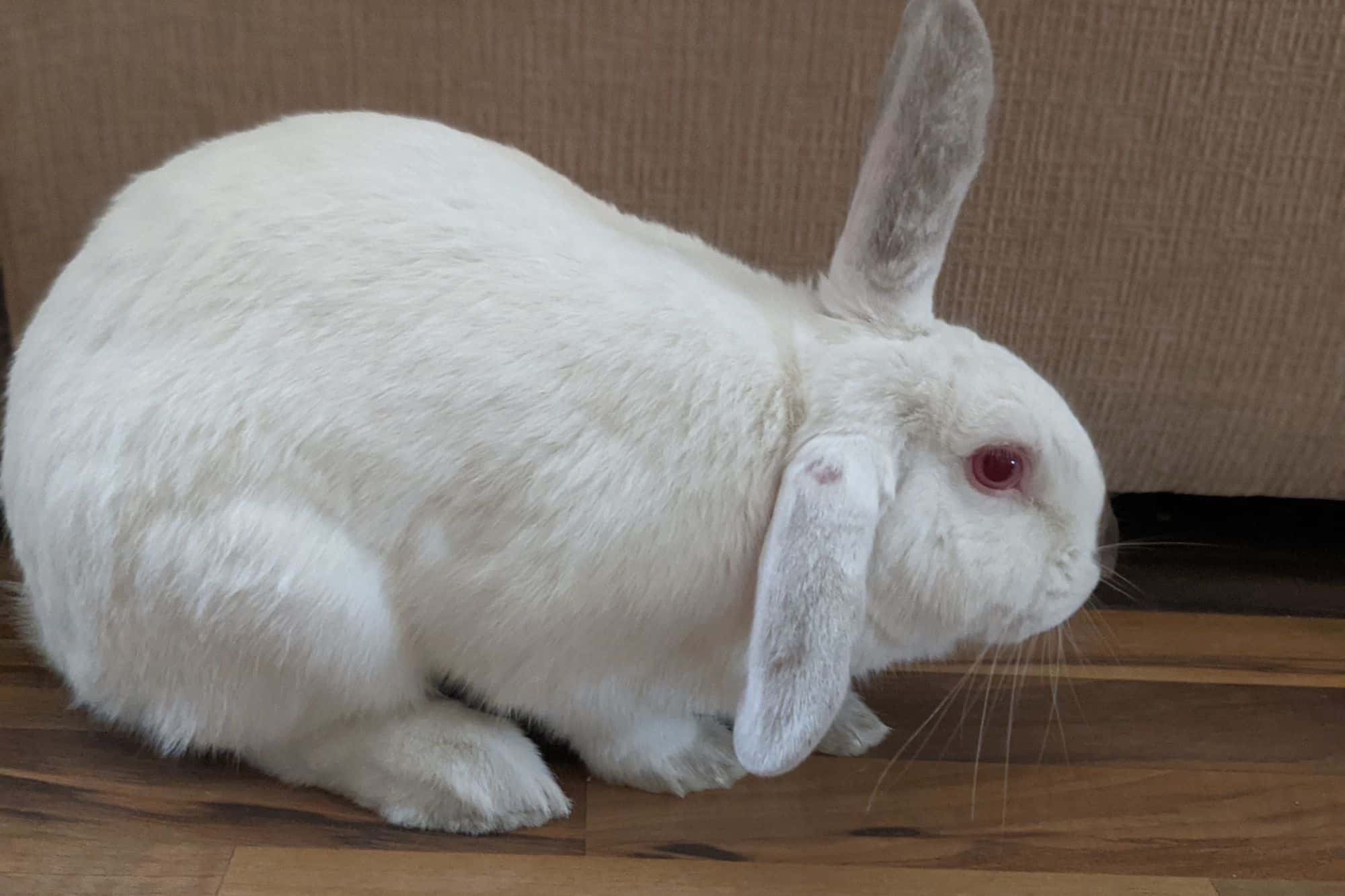
Milk is an ideal drink. Often, it is the primary source of nutrition for most baby mammals. So we can’t blame you if you think it’s safe, even healthy, to give it to your bun. But can rabbits drink milk, or would this nourishing beverage do more harm than good?
The answer depends on several things. These include the age of your rabbit and the kind of milk he gets. Let’s see when you should give milk to your bun and what type will be safe for him.
This post contains affiliate links. Affiliate links support Every Bunny Welcome at no additional cost to you. I receive a commission if you choose to make a purchase through these links.
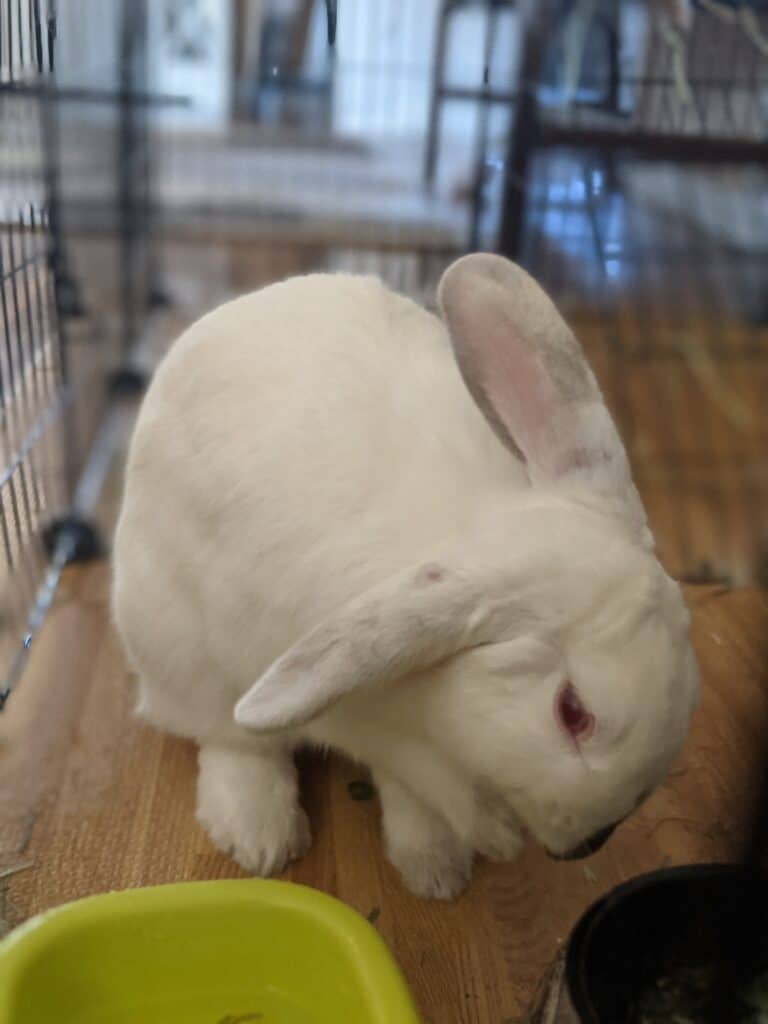
Do Baby Rabbits Need Milk?
Like most mammals, baby rabbits or kits need milk at birth and for several weeks afterward. Without it, they won’t survive. However, unlike companion animals such as cats and dogs, kits don’t feed constantly. The mother rabbit nurses her babies only once (rarely twice) a day and for only around 5 minutes.
The kits thrive despite the limited feeding sessions because rabbit milk has a unique property. It contains more calories than most types of animal milk. Because it’s so filling and rich in nutrition, the baby buns get their whole day’s requirement during that short time frame.
When baby buns are two weeks old, they start to eat solids. Upon reaching four weeks, they will eat the same food as their mommas. However, they’ll still need milk until they’re about 6 weeks old.
Should Adult Rabbits Drink Milk?
Buns are herbivores, so they thrive best on hay and other plant-based food. Kits need milk to survive, but it’s a different story when it comes to adult rabbits. Upon reaching maturity, they become lactose-intolerant. This means they can’t process the protein in milk and other dairy products. Thus, feeding them milk won’t offer any health benefits but instead can even cause harm.
Can Baby Rabbits Drink Cow’s Milk?
Not all kits are lucky enough to get milk from their mother. For example, the mother rabbit can leave her babies before they can survive on their own, or she may die. In their mother’s absence, it falls on you, their owner, to provide the milk they need.
Those new to rabbits may think of cow milk as the best substitute to rabbit milk. This is not the case, and you shouldn’t give cow milk to rabbits.
Risk with Cow’s Milk
Milk from cows is not suitable for rabbits. Kits can’t digest it and might even die from it. Rabbits have sensitive stomachs, especially when they’re young and can’t process the substances in cow milk. Those substances can be toxic to rabbits, and because they can’t vomit to purge the contents of their stomach, they get sick and die.
Cow milk can harm rabbits because of the following reasons.
High Lactose Content
Rabbits, particularly adults, lack the good bacteria that break down the lactose in milk. Unfortunately, cow milk has high levels of lactose. Kits aren’t lactose-intolerant yet, but they can’t consume too much of it. Rabbit milk has less than 0.0044 lb. (2 g) per 0.22 lb. (100 g). Compare that with cow milk which contains approximately 5% lactose for the same amount.
Contaminants
Many dairy cows have mastitis or breast swelling due to infection. This condition can lead to the formation of pus, which gets into the milk. Rabbits who drink pus-contaminated milk run the risk of developing bacterial infections.
The Presence of Hormones
Cows are often injected with hormones. These hormones are designed to calm the cows down, hasten growth, or increase milk production. Naturally, the hormones find their way into the milk. Since none of these hormones are rabbit-friendly, drinking cow milk can lead to health issues in baby bunnies.
Antibiotics in the Milk
Antibiotics are commonly used to treat diseases and infections in cows. A significant level of these drugs gets into the milk and can harm those who drink it, including rabbits.

When Baby Rabbits Can’t Drink Milk from Their Mother
If the mother bun rejects her kits or has died, you’ll have no other recourse but to provide the baby bunnies’ nutritional needs. Instead of cow milk, you can give the motherless kits alternatives to rabbit milk.
Feed the substitutes to the young ones until they’re around 6 to 8 weeks old. After that, you can slowly replace the rabbit milk substitute with water.
Here are some alternatives you can give baby rabbits in case you can’t find rabbit milk.
Kitten Milk Replacer
No, this milk isn’t for cats. Baby bunnies are also called kittens, so don’t confuse the two. Kitten milk replacer (KMR) is a substitute especially designed for rabbits. It’s a protein-rich formula made with whey, eggs, and oils and is fortified with vitamins and minerals.
Like rabbit milk, KMR is calorie-dense, so it can help tide the baby buns through the period when they need milk to survive. You can get this milk formula in veterinary clinics or pet stores.
Goat Milk
Goat milk isn’t as high in lactose or sugar as cow milk. It also has smaller fat molecules, making it easier for baby buns to digest. But not just any goat milk will do. There are different goat breeds, and the content of their milk varies. Milk from Meyenburg goats works best for baby rabbits.
Still, you’ll need to mix it into a formula and add other ingredients so it can meet the needs of young rabbits. You can find goat milk here.
Note on Milk Formula for Infants
Infant formulas are meant for humans. That makes their nutritional values vastly different from rabbit milk. Moreover, most baby milk formulas are made from cow milk, which has a high sugar and lactose content that young buns can’t tolerate.
Drinking baby milk formula can cause diarrhea in young rabbits. The condition can lead to dehydration and even death.
Accidental Ingestion
If it’s a small amount, don’t panic. A sip from your glass or a lick from your cereal bowl won’t kill your bun. At most, he could get a touch of diarrhea. Just don’t make it a habit to give milk to your rabbit.
If you’ve been giving milk regularly to your fur baby, stop the habit and replace his milk intake with water. Also, keep a close eye on his poop and toilet habits. His droppings should be round and hard. A trip to the vet is in order if it’s loose or if he hasn’t pooped for the past 12 hours.
Best Hydration Options for Rabbits
Your bun is better off drinking plain water instead of milk. In fact, clean, fresh water is the best drink for buns. Tap or bottled, it doesn’t matter. If it’s safe for you, it’s safe for your pet, too. Whether you should offer the water in a bowl or bottle depends on what works best for you and your pet.
However, refrain from giving your furry pal the following:
- Spring water: It’s high in minerals and can cause stomach issues.
- Water from a hose: Some hoses contain lead.
- Waters in puddles or ponds: It may have Giardia protozoa that cause intestinal troubles.
- Pool water: Chlorine and other chemicals in the water can be toxic to rabbits.
Can rabbits drink milk? Yes, they can but only when they’re young. Moreover, only their mother’s milk is 100% safe for them. In the case of orphaned or rejected bunnies, you can provide alternatives to rabbit milk. However, cow milk is not one of those rabbit-friendly substitutes.
Rabbits can drink milk when they’re really young, and their mother’s milk works best for this purpose. Some alternatives exist but use these only in case of emergencies.
More on Rabbit Diet
- Is Orchard Hay Good for Rabbits?
- The Best Lettuce for Rabbits: What Type Can They Eat
- Complete Guide to the Best Hay For Rabbits: Reviews & More
- What Can You Feed Wild Rabbits: A Comprehensive Guide
- Can Rabbits Have Cabbage? What You Need to Know!
We hope you enjoyed this post! If you did, will you give it a share or two 🙂 Thank you! ~from Every Bunny Welcome


